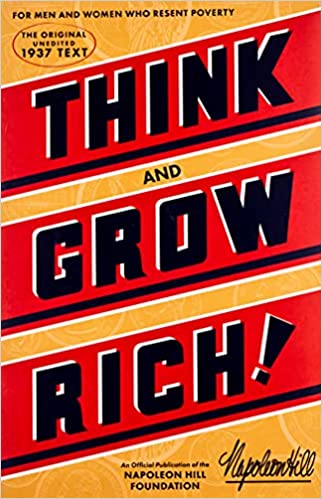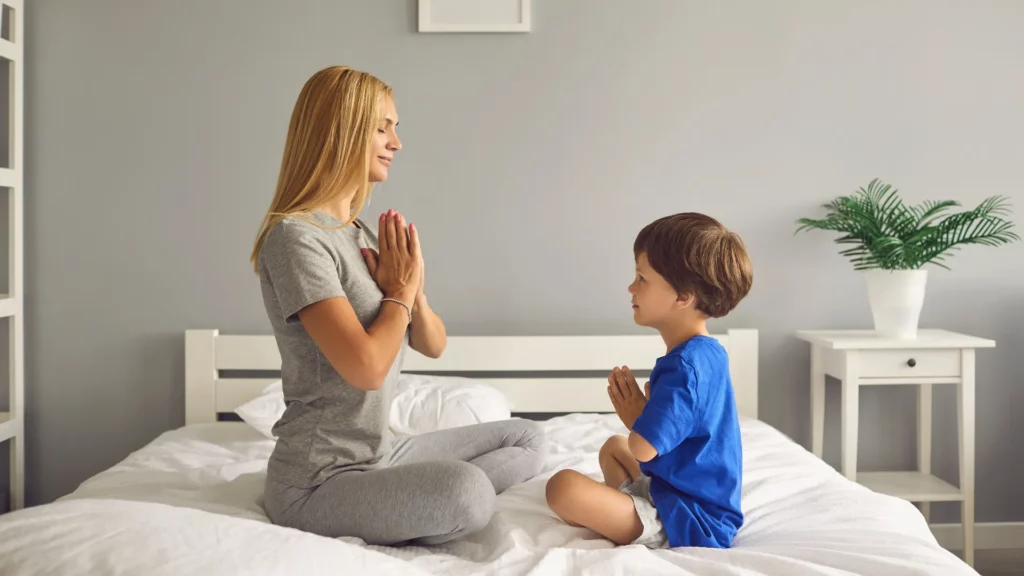
What is Meditation?
Meditation is an ancient practice that focuses on mindfulness and focused attention that helps stimulate your mind and eliminate jumbled thoughts. It is a common relief of stress and provides a deep fell of relaxation and tranquility. Meditation practice has been linked to mental and physical ease, and as a health booster, it is widely recommended. The practice is thousands of years old and continues to positively influence many people’s lives in reducing stress and anxiety and for relaxation.
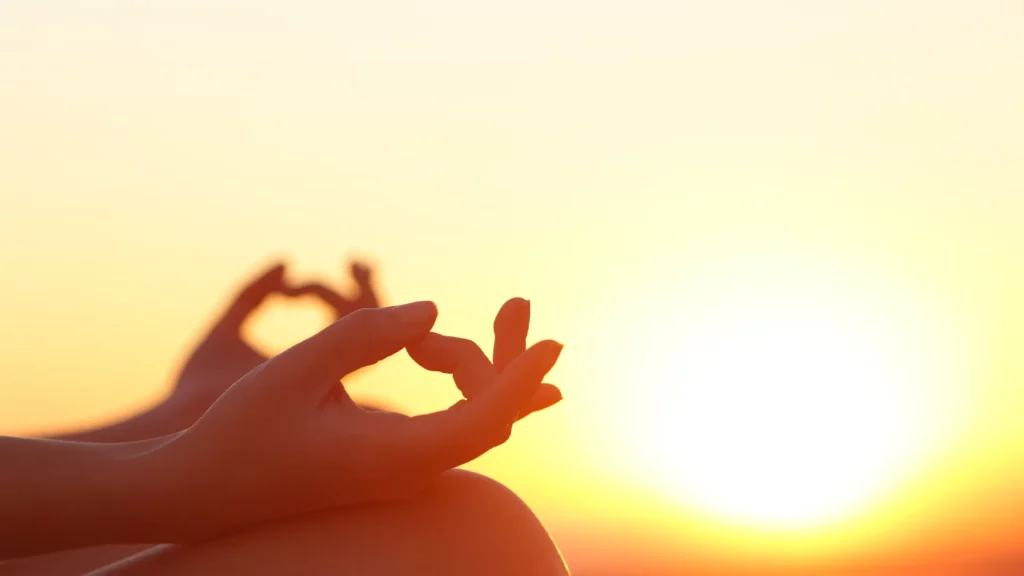
Why Meditate?
There are a number of reasons to meditate. Meditation has tremendous benefits, bringing forth the importance of dedicating a few minutes to silence and meditation. One significant benefit is a person’s overall wellbeing, which reflects stability and inner peace. Some of the benefits of why people meditate include:
What Are The Benefits Of Meditation:
-
Increasing self-awareness
Awareness meditation brings out the effect of us seeing ourselves more clearly. It allows you to quieten your thoughts and enable you to engage with yourself on a deeper level by bringing awareness to yourself without feeling absorbed.
-
Focusing on the present
Meditation can refocus your attention at all times, thus preventing your mind from wandering. For this reason, you are more in tune with the present feelings. It builds a deep sense of concentration, which reflects how you do your work and thus builds resilience, and therefore you can refocus when faced with distractions.
-
Reduces Negativity
Through medication, you can acknowledge negative thoughts and let them go. Mindful meditation ensures that you efficiently manage these thoughts and do not dwell on the outcome of the negativity. Meditation helps you regain your focus on acceptance and changing the negative thoughts.
-
Increasing imagination and creativity
Meditation allows us to be in touch with ourselves, explore our strengths, and change the patterns of thoughts that may limit our growth. Therefore, in doing so, meditation opens your mind to new ideas, and through the attention given, it becomes easier for you to discern the novelty of these ideas.
-
Increasing patience
Mindful meditation, as witnessed, can breed deep self-awareness. This awareness also gives way to frequent self-reflection, which is essential to create a growth pattern by ensuring you feel relaxed. Thus, even in moments of unrest, you can actively let things go and be tolerant.
-
Improving sleep quality
Often sleepless nights are caused by racing thoughts. Mindful meditation can be introduced, especially before sleep, to slow down your thoughts and body activity. This is a step towards lowering stress levels in the body, which can help your sleep better. Sleep quality is essential for productivity; hence, meditation can easily evoke good relaxation and restfulness even in rest.
-
Opens You To New Perspectives
Just like imagination and creativity, meditation highly influences our growth. It is an excellent source of balance and calmness, essential for wellbeing. Through this process, you get to experience improved awareness of different ideas, and thus your attention opens to other perspectives and concepts that may be effective for your elevation.
-
Reduces Depression
Depression is mainly caused by anxiety and stress. Mindful meditation helps your mind focus on a single thing, silencing the noise from your thoughts and all negative thinking. When negative emotions come, the brain can refocus into a positive part and let all these sensations pass reducing depression naturally. This significant aspect ensures you have peace and balance to help you cope with adverse situations and keep the inner peace.
Types Of Meditation?
Different forms of medication come with other benefits. Therefore, you can engage in various meditation styles depending on the outcome you would love to achieve. Some of these include:
-
Mindfulness Meditation
This is the practice of being present in the moment. It is a practice that helps build our resilience and focus into actually being present in the moment under challenging situations. Mindful meditation focuses on easy exercises like breathing, concentration, body awareness, releasing tension, and walking. These are practices that help you concentrate and be in the moment.
-
Guided meditation
It is a type of meditation led by a teacher who takes you through different steps to help you enter deep tranquility. This is done through a series of visualizations the leader takes you through, allowing you to relax slowly and clear your mind. The practice enhances your sense of self and can be an enjoyable experience.
-
Mantra meditation
This meditation practice uses repetitive phrases to promote deep focus and attention. These soft tunes are spoken, whispered, or chanted to enhance your body’s stillness. This effect is responsible for offering consciousness to the maximum impact giving you improved concentration.
-
Qi gong
It is a moving meditation involving exercises to optimize energy within your body, mind, and spirit. Qi gong is well known to help maintain good health and wellbeing. It is a popular Chinese form of meditation that relies on the flow of body energy commonly referred to in Chinese medicine to offer a cure.
-
Tai chi
This is also a movement meditation technique that uses slow and careful movements. You must first stand without feet shoulder-width apart, toes pointing ahead, and slightly bent knees. Keep your shoulders down and relaxed, and have your head held up. You are expected to take deep breaths through your nose in this position. This form of meditation improves balance and flexibility in your body.
-
Transcendental meditation
It is a simple form of meditation that is done while sitting comfortably. You only have to close your eyes for a few seconds, take a few deep breaths, and relax your body. With this done, silently repeat the mantra in your body and entirely focus on it. After a few minutes, open your eyes. It is a simple practice taught by certified practitioners to quiet the mind and induce a state of calmness.
-
Yoga
Yoga is a movement meditation deeply rooted in the connection between mind, body, breath, and presence. Through the different poses, yoga includes techniques that enhance breathing and meditation principles that help control and still your mind.
When To Meditate?
Any moment you choose to meditate is a good time. There is no perfect time for you to meditate, and since people vary broadly, it is only essential to ensure that you do it at a convenient time. People have often linked early morning hours as the perfect tie for meditation; however, you should know that it does not have to be a specific time. You only have to take some time off your schedule and practice meditation to restore that inner peace. You can choose morning hours or before sleeping and even in between tasks. Any time to make you productive and peaceful is great as it wards off self-doubt and distraction.
Where To Meditate?
Sacred places or institutions have often been associated with meditation as they encourage deep introspection and serenity. However, meditation can work anywhere, especially where you feel safe and comfortable. This could be at home, outside, or even while taking an evening or afternoon stroll. The meditation area may not be as important as the commitment to the practice itself. These are a few popular places that you may want to look into when starting your meditation journey.
-
Grassed Area/Garden
Green has always been associated with having a calming effect. Therefore, while out in nature, you can easily be in touch with the surroundings, shift your thoughts from your everyday thoughts, and thus clear your mind. A serene environment stimulates your mind with a sense of peace.
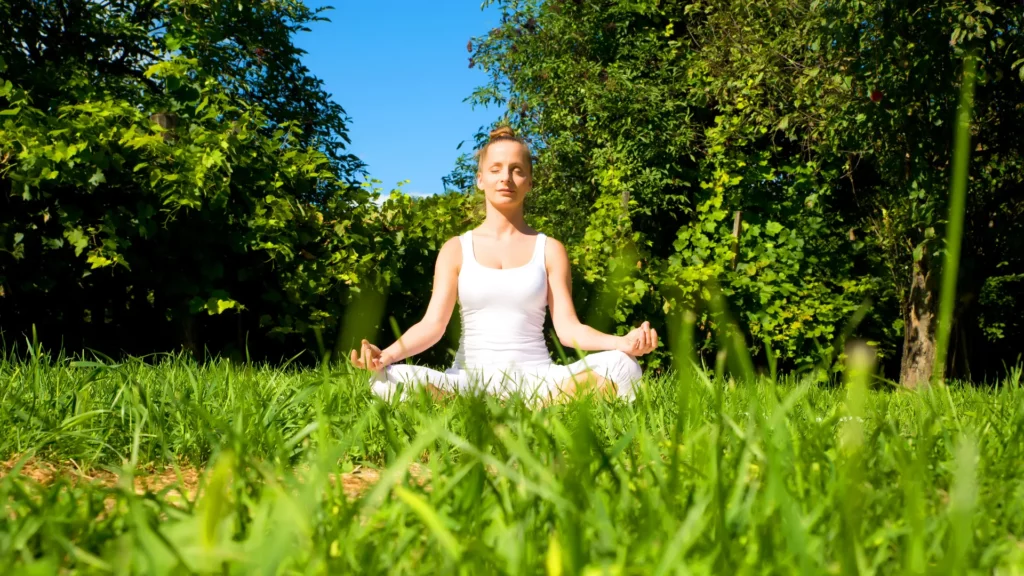
-
By The Sea, River Or WaterFall
Water can be soothing; therefore, when you see or hear the sound of moving water, chemicals are induced in your body, increasing blood flow to your brain and heart, thus, causing relaxation. The soothing effect of running water can lower episodes of depression and help you gain emotional stability that improves your wellbeing.
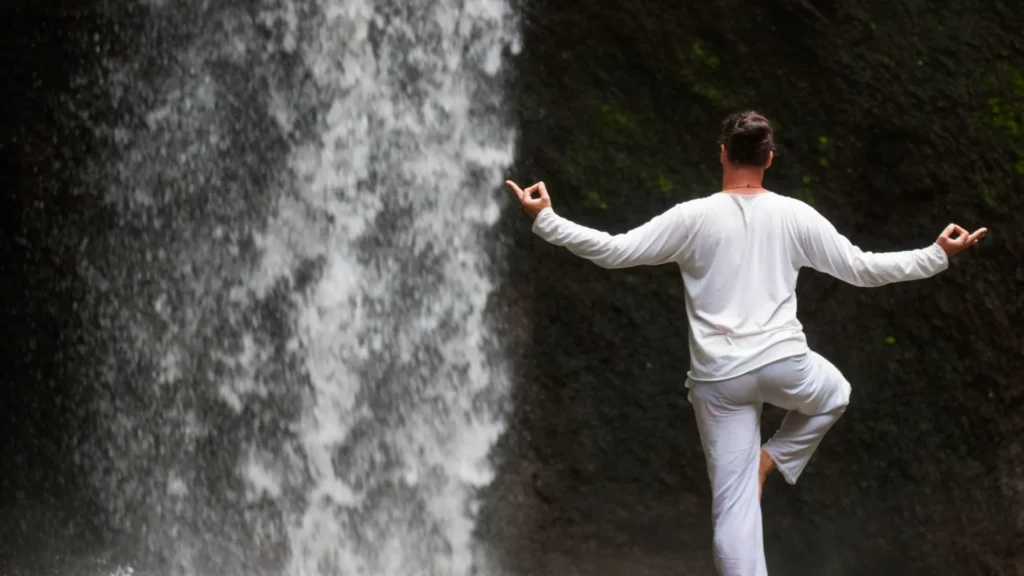
-
A Peaceful Place At Home
A peaceful space is vital for change and productivity. When you identify a spot at home that you can go to while feeling stressed, you can use it to unwind every evening or choose to meditate there at any time. This could be in your living room, porch or outside. Just ensure that it is a space where you feel safe and relaxed.
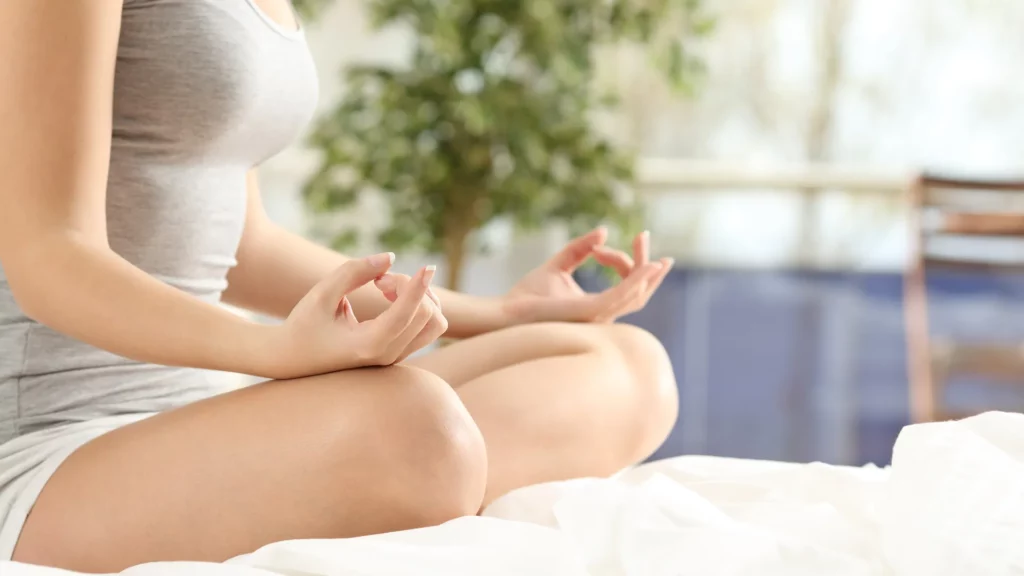
How To Meditate For Beginners
If you’re a beginner, meditation should not be rooted in identifying perfect places or poses to help you achieve stillness. Nor should you focus on lenght of time. But try to aim for 10 minutes It only requires simple steps, willingness, and commitment to growing your body. Here are the steps to meditate.
-
Find a Quite Comfortable Place to Sit
A quiet and comfortable place is essential for meditation. This will help you minimize distractions by allowing you to move or be still without any disruption. This can be in your house, garden or car; ensure that it is a safe and comfortable space.
-
Relax Your Body and Close Your Eyes
Closing your eyes is easy to shut down all the activity around you and propel attention inwards. This quickly causes your body to relax and prevents you from having distracting thoughts from the activities in your surroundings. Closing your eyes causes your brain to be more engaged, giving you details and imagination that can be used for challenges you are facing or other creative suits.
-
Take 4 Big Breaths, Then Return to Normal breathing
This process greatly engages the body and can reduce anxiety and sharpen memory. It can also be a central position to build your concentration by focusing on breathing in and out. Breathwork practices are practical options for calmness.
-
Do a Body Scan
This involves paying close attention to your body in particular parts that give gradual sensations from the head to the feet. This effective method can help you determine your general discomfort and tension in your body.
-
Focus on Your Purpose with Positivity
Feed your mind with positive approaches that, despite intrusive negative thoughts, you can also have a productive day and life. These ensure you achieve your purpose and get close to your personal growth. Positivity helps bring success, health, and happiness.
-
Say 3 Things You Are Grateful For
Gratitude is essential in improving your wellbeing. It helps you appreciate and feel more positive about experiences and relationships and deal with adversity. Gratitude also allows you to reflect on your surroundings and experiences and block all negativity.
-
Open Your Eyes, and You’re Done
Once through with these steps, open your eyes and stay still for a few seconds. You will notice a shift in your mental space and perhaps an improvement from a few minutes before. With mindfulness and intention, this should be a process that builds you immensely.
6 Tips On How To Meditate For Beginners
These are small steps you can follow as a beginner. Learning and understanding how to comfortably meditate may take a while, but it is worthwhile.
- It Takes Practice: Good things take time, and you will often find many distractions around you while starting. You can start small by choosing a serene or quiet place or allocating a few minutes in a day to create. With time, you will realize there will be change and fewer distractions.
- Watch Your Breathing: Be aware of everything you do. Every action in your body should be registered, and breathing is one of the exercises that you can start by focusing on. Deep breaths can help you release tension, allow blood to flow to your body, and help it relax.
- Relax your arms and hands: Your arms and hands should not constantly move, meaning you should be still. This helps your body relax, generally allowing your brain to work at the moment and refocus your thoughts. Hands are easy distractions and can take your concentration away so easily. Therefore, ensure you are relaxed.
- Your Mind Will Wonder: And thats ok, just guide your mind back to the topic. Concentration does not come in one day. While starting, your mind will often wander into different thoughts and actions, making you slightly disoriented. Clouded thoughts may take time to refocus, but daily practice will help you improve your thoughts and even understand how to harness your concentration.
- Don’t Force Emotions: You do not need a specific emotion to meditate. You can do it anytime and, in any circumstance, as long as you have the time and space. Forcing emotions makes the process more complex as your mind is tense, thus adding to your body’s physical stress
- Set A Time: This is one of the best ways to build a routine or habit and, even better, prioritize your wellbeing. If possible, ensure you also have reminders to help your mind focus and remember the same. Setting away time every day and intentionally wires your mind into creating a habit of change and also improving your overall wellbeing. Meditation can be done from a few minutes to hours, so you only have to start small, and with a small practice, you can quickly improve your life.
- Use A Mantra If It Helps: Think of a mantra as a convenient tool that can help shift thoughts in your mind. As a beginner, concentration can be tough to attain; thus, a mantra may come in handy to help shift your thoughts. It is a practical approach to building and boosting awareness and good concentration. Learn the different mantras and how to use them, and then effectively incorporate them into your daily activities. It is an excellent step towards calming you as uttered repetition improves the mind’s and body’s focus
Final Thoughts
Meditation is a very effective tool that you can use to help you in whatever you are going through. It is a habit that shifts your thoughts towards giving you the greater sense of wellbeing and peace you need. If you are thinking of starting, you can follow the steps, research the type of meditation styles, and choose one that is comfortable for you. With these, it will be easier to identify how you can grow and acknowledge the changes your life will take.




